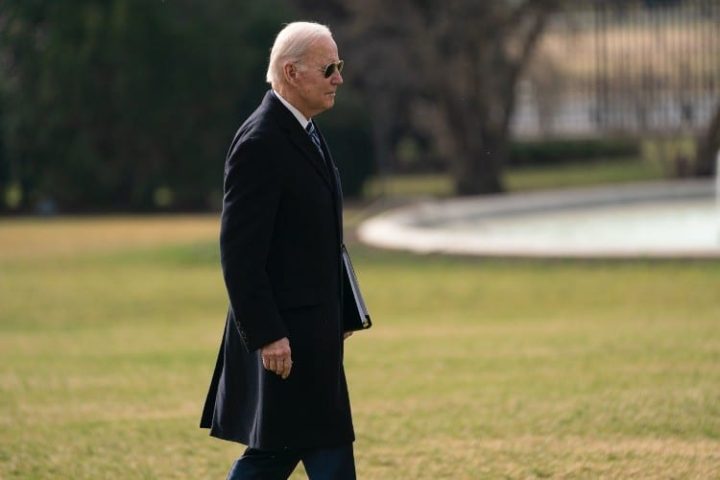
“I thought it was critical that there not be any doubt, none whatsoever, about U.S. support for Ukraine in the war,” Joe Biden declared during his recent visit to Kyiv, as reported by The Wall Street Journal. While in the country, Biden promised an additional $460 million in military aid to Ukraine.
With that declaration of devotion to the defense of a foreign nation — authority not granted in the U.S. Constitution to the president or any other department of the federal government — Joe Biden seems to have committed the United States to the prosecution of another forever war, à la the “War on Terror.”
Later, in a speech delivered in Warsaw, Poland, Biden doubled down on his assumption of autocratic power and on the permanent association of Russia’s invasion of Ukraine with an invasion of the United States:
When Russia invaded, it wasn’t just Ukraine being tested. The whole world faced a test for the ages.
Europe was being tested. America was being tested. NATO was being tested. All democracies were being tested. And the questions we faced were as simple as they were profound.
Would we respond or would we look the other way? Would we be strong or would we be weak? Would be — we would — would we be — all of our allies — would be united or divided?One year later, we know the answer.
We did respond. We would be strong. We would be united. And the world would not look the other way.
Regardless of your opinion on the war in Ukraine, it is a demonstrable fact that there is not a syllable of the U.S. Constitution that authorizes either the president or the Congress to commit the United States to financing a foreign nation’s war against another foreign nation. No one who is a friend of the Constitution should be found backing the billions being taken from American working families and sent to European oligarchs.
As you might expect, the Founding Fathers warned against the assumption by the president of the power to foment war in foreign countries.
In his now nearly forgotten “Helvidius” letters, James Madison warned against allowing the president to exercise control over the military in the absence of a congressional declaration of war.
To allow the president to deploy American troops without a declaration of war would, Madison declared, “prove a snare to patriotism” and “strike at the vitals of the constitution.”
In the second of these essays, Madison warned that if Americans permitted the president the power to send troops into combat without a congressional declaration of war, “no ramparts in the constitution could defend the public liberty or scarcely the forms of republican government.”
Finally, the Founding Fathers learned of the threat to liberty posed by perpetual warfare from the men whose books they read as children, books whose authors are completely unknown to most Americans today. Here are a couple of examples of warnings against unnecessary warfare from books quoted repeatedly by our Founding Generation in their letters and speeches:
Emer de Vattel, The Law of Nations (1758):
Whoever, therefore, takes up arms without a lawful cause, can absolutely have no right whatever: every act of hostility that he commits is an act of injustice.
He is chargeable with all the evils, all the horrors of the war: all the effusion of blood, the desolation of families, the rapine, the acts of violence, the ravages, the conflagrations, are his works and his crimes. He is guilty of a crime against the enemy, whom he attacks, oppresses, and massacres, without cause: he is guilty of a crime against his people, whom he forces into acts of injustice, and exposes to danger, without reason or necessity, — against those of his subjects who are ruined or distressed by the war, — who lose their lives, their property, or their health, in consequence of it: finally, he is guilty of a crime against mankind in general, whose peace he disturbs, and to whom he sets a pernicious example. Shocking catalogue of miseries and crimes! dreadful account to be given to the king of kings, to the common father of men!
Hugo Grotius, The Rights of War and Peace (1625):
What is done in an unjust War is unjust in itself.
We then first declare, if the Cause of the War be unjust, tho’ it be undertaken in a solemn Manner, yet all the Acts of Hostility done in it are unjust in themselves. So that they who knowingly do these Acts, or join in the acting of them, Are to be accounted in the Number of those, who without Repentance cannot enter into the Kingdom of Heaven, 1 Corinthians 6:10. But true Repentance, if Opportunity and Ability will allow, absolutely requires that he who has done any Damage, either by killing, ravaging or plundering, should make full Restitution.
Aristotle, Politics (ca. 350 B.C.):
So long as they were at war, therefore, their power was preserved, but when they had attained empire they fell, for of the arts of peace they knew nothing.
Tacitus, Agricola (ca. A.D. 120):
Alone among men they covet with equal eagerness poverty and riches. To robbery, slaughter, plunder, they give the lying name of empire; they make desolation and call it peace.
To date, the American taxpayer has been forced to fund Ukraine’s war and the lifestyles of Ukrainian politicians to the tune of nearly $77 billion since the inauguration of Joe Biden in January 2021.



